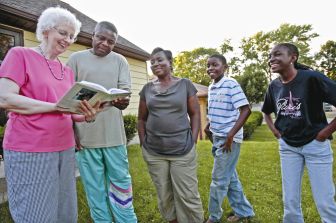
Invisible Children’s KONY 2012 campaign has seen worldwide endorsement, its central focus being Uganda. But as the threat of Joseph Kony and his Lord Resistance Army (LRA) gains traction, it has become more and more evident that the LRA isn’t exclusive to Uganda.
Among the other countries in which the LRA operates are South Sudan, the Central African Republic and a place that Sister Josephe Marie Flynn, SSND, herself is more than familiar with: the Democratic Republic of Congo.
Flynn, co-founder and chairperson of the Milwaukee Archdiocesan Justice for Immigrants Committee, vitalized a momentous campaign for her Congolese friend, Regina Bakala, in the wake of her impending deportation from the United States in 2005.
Bakala was in desperate search for asylum within the United States after having escaped her homeland. She experienced the terror of going against mainstream politics firsthand.
“I came to the United States on July 29, 1995,” Bakala said on Milwaukee’s Archbishop Jerome Listecki’s bi-weekly radio program on Nov. 18, 2011. “I was involved in a political party specially to help the women. Because in Africa, they treat women like they’re nothing… women don’t have a voice… I give a voice.”
The harrowing reality of her giving these women a voice, however, was that Bakala’s own life was put in jeopardy.
“Before we had President Mobutu, we [had] just one political party,” Bakala said. “And then after [he was elected], he said we have a democracy and [that we had] too many political [parties].”
Bakala explained that in her hometown, women weren’t allowed to vote or talk. They “could not say anything.”
She felt that it was her duty to tell these women and their children about democracy. But her advocacy for democracy, to them, made it seem that she had “betrayed the president.”
Bakala was raped and nearly killed for her opposing views.
After promising her husband that she would no longer speak out and advocate for democracy, Bakala remained quite for a while. But she couldn’t remain quiet for long.
“It was something that I just [wanted to do] for women,” Bakala said. “And then I was raped for the second time.”
She recounts her fears of losing her husband. In Africa, when a woman is raped, it’s “just like nothing,” no one looks at the woman anymore and the woman’s husband, more often than not, divorces her.
Nevertheless, she was able to escape to the large city of Brazzaville in the Congo, where she and her family sought assistance in getting out and to the United States.
Getting out of the Congo, however, proved to be only the first part of Bakala’s story. In 2005, after having spent an entire decade in the United States, Bakala and her family found themselves on the opposing side of another political system.
She spent three months in a federal prison after her appeal for asylum was denied and her lawyer failed to contact her about the decision. Bakala was incarcerated on Tuesday of Holy Week, with Flynn at odds with what to do for Bakala until Thursday of that same week.
“I said, ‘okay, I’ll do something but you just better be there,’” Flynn joked, referring to her request for guidance from God. “Because I had no idea what to do… And finally after two weeks, I put a flier on the bulletin, and that’s when people just came out of the woodwork to help. And God was coming through the people to help. It was amazing.”
Bakala’s compelling story unravels as a testament of perseverance and determination, offering not only a rare glimpse at the horrors of an unjust and corrupt society overseas, but also at the corruption here in the United States – a corrupt political force which refuses to provide for those who, like Bakala, have nowhere else to turn.
Flynn is slated to share her perspective and to discuss what can be done to help in an interactive workshop held in Founder’s Hall Room 279 on Tuesday, April 17, from 2 p.m. to 3:15 p.m. and from 3:15 p.m. to 4:30 p.m.


